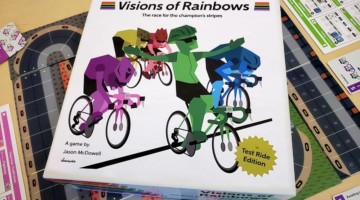Our favorite U.K. columnist David Evans is back, this time to discuss something we’ve been thinking a lot about lately: Flemish. With the surge of Belgians heading to the US for Worlds (we hope!), we’re getting nervous about our abilities to navigate the crowds in Louisville effectively and politely, so David took it upon himself to write us a primer. Just don’t ask us where the restrooms are, because we haven’t gotten that advanced yet. But today we tackle grammar, and you might get to learn how to say that you ride a bike!
Morning class! Do come in and sit down quickly; I want to be able to finish on time today. Last week overran a bit. It’s no fault of yours. I do go on. I’ll be working from the board more this week, so do sit near the front.
Today’s topic: syntax and grammar. Don’t make that noise. Grammar is a beautiful thing, or at least it can be. Grammar is what lets us talk about what might have been, what could be, and everything in between. Spending this week learning the difference between an object and a subject, and maybe even between an article and a noun, will save us countless headaches and self-flagellation in the weeks to come. By the end of this lesson you’ll know Dutch present tense syntax like the back of your hand, you’ll be aware of the conjugations of present tense verbs, and you’ll probably know your way around personal pronouns. We’ll get on to pronunciation, we’ll get on to greetings, but first: Grammar.
Now, although the conceit of the first lesson – a reminder, I’m an experienced if circumlocutory scholar of Flemish and you, the reader, are part of a class that deals with the socio-cultural history of Belgium and cyclocross through the study of the Flemish language. Admittedly, this conceit was pretty much dead in the water to begin with [1], but let’s flog this particular dead horse for a while longer.
What was that, class? Oh, yes. We are going to take some sentences, in English and Flemish, and pick them apart and see if we can figure out the rules that allow the sentences to have meaning. It’ll be far easier and considerably more fun than it sounds.
People don’t really learn syntax and grammar any more [2]. This is irrelevant, but the reason for grammar not being a core part of English and American curricula is that a) it is really hard to teach – like, really hard, and so many teachers fall back on forcing their students to learn grammar by rote which is, I should say, far from A Good Thing; b) it’s also quite hard to figure out if you’ve taught it well, and this lack of quantification is anathema to modern didactic thinking; and finally, c) phonics became a popular way of teaching the basics of English, and eventually usurped the study of grammar entirely, much to everyone’s detriment [3].
The unintended but inescapable consequence of all this is that when it comes to learning a foreign language, people who have been through English-speaking education systems are at a considerable disadvantage. Let’s start by re-visiting English grammar. And I swear so help me God if I hear one more of you groan in that way I am not going to let you go to lunch on time.
I ride a bike.
This is an example of the classic English sentence. This is the burger and fries of English grammar. We have a subject (“I”), we have a verb (“ride”), and we have a subject (“a bike”). For now, lets think of the subject as ‘the thing that does stuff’, the verb as ‘the stuff that is done’, and the object as ‘the thing that has stuff happen to it.’
There are a few more bits of information that ultra-nerds could notice in this sentence, such as the use of an indefinite article stops us from knowing which bike it is that I ride, etc., but let’s leave it at this: the sentence wouldn’t make sense in any other order.
- Ride I the bike.
- The bike I ride.
Nope. Neither of those work. Why? Because the order of the words – the syntax – is what mediates the meaning of the sentence.
What does that sentence look like in Dutch?
Ik rijd een fiets.
Without a dictionary or Google Translate, let’s make an educated guess about what is the subject, the verb and the object in this sentence.
Anyone? You, sitting under the portrait of Sven Nys. Correct, the subject is “ik”. So what is “rijd”? Correct again! It’s the first person, present tense conjugation of the verb “to ride.” You, madam, you deserve to be sitting by the portrait of Sven Nys. So that leaves “een fiets” to be “a bike.” Excellent.
The order of the words in the sentence – the syntax – is the same as in English, which is very thoughtful of them indeed. SUBJECT – VERB – OBJECT; as English as The Queen [4], and, apparently, as Dutch as tulips.
Ah, but, one caveat: in Dutch, there is another way you can order your sentences. If there is a time marker – i.e., today, now, later – it can go at the front of the sentence. In that case, the subject and verb switch places, so the sentence will go TIME MARKER – VERB – SUBJECT – OBJECT.
So, with that in mind, translate “I ride a bike regularly” in to two different versions. Hint: regularly = regelmatig.
Ready for the answer? Pens down.
Ik rijd een fiets regelmatig OR regelmatig rijd ik een fiets.
Isn’t this just as much as I promised. No? Take a break, listen to some euro-pop, and I’ll see you in a few minutes for the second part of the lesson.
English verbs are really irregular, only we’re so used this irregularity that being told about it is as strange as being told that cable-actuated disc brakes aren’t infallible. Yeah! I know! A present tense conjugation in English goes something like this:
- I play
- You play
- She/He/It plays
- We play
- They play
Notice that there is only one change in the whole sequence [5]. Lucky us. To conjugate a verb, we take the infinitive form of the verb – to play – knock off the ‘to’, and we’re pretty much good to go. Notice that in English we don’t make a distinction between genders, except in the third person – ‘you’ or ‘they’ could refer to female or male people.
Dutch, as far as these things go, is quite regular when it comes to verb conjugation [6]. Again, lucky us. But their verbs work quite differently, and their pronouns are going to be quite alien to us. Pronouns are the little words we use to qualify the verb, ie. I/You/He/She/It/We/They. These ones are used as subjects in sentences, and are quite unimaginatively called ‘subject pronouns’. The Dutch do distinguish between genders in their pronouns, but only in the third person (they have three genders; don’t ask, we don’t have time). They also have a plural you pronoun, jullie. To keep things short, we’re only going to look at the singular subject pronouns.
Almost all Dutch verbs end in –en. Just so you know.
To conjugate your freshly baked Dutch verb, take off the –en. Then follow these steps:
- I —-> Ik —-> do nothing
- You —-> Ge —-> add ‘t’
- He/She/It —-> Hij/Ze/Het —-> add ‘t’
So lets practice by conjugating the verb ‘to play’, Spelen.
- I play —-> – Ik —-> spel
- You play —-> – Ge —-> spelt
- He/She/It plays —-> – Hij/Ze/Het —-> spelt
Right, so that was draining, wasn’t it? I know how painful that felt, trust me, I do. But I feel you’re better people for it and, more importantly, better ’cross racers.
Really.
Homework:
There’s no homework this week. I’m no sadist.
[1] By virtue of me writing an article and, sadly, never being able to demonstrate the pronunciation of Flemish, nor hear you speak it, nor grade your work, nor do any of the super important things like differentiating tasks for students of different abilities, or identifying the various learning styles and adapting work to suit, or making you at ease by creating a supportive learning environment, all the little things that a good teacher would do without you even noticing consciously even if it did leave you with a warm and hard-to-define residual sensation of you having been looked after in some special way by a caring and mindful intellect and… it was never going to be more than a way of me creating a chatty and faux-intellectual persona to carry me through a topic I really know close to nothing about.
[2] This isn’t to say that people in England and America have regressed to some slobbering and meaningless pre-grammatical state of being. Clearly, we all know grammar, it’s what allows us to form sentences and heckle racers and read Cyclocross Magazine. My point is that we don’t know how to explain what we know, which is a weird position to be in when you think about it.
[3] In my honest/humble opinion.
[4] Don’t get me started on that one.
[5] This, by the way, is the reason why non-English speakers seem to pick up English quite so quickly – in the present tense, there just isn’t that much to learn. Don’t worry, we save our super-weird irregular grammar fetishes for certain past participles and the like.
[6] Here is where I say a little prayer of thanks that Dutch isn’t a language with an armful of declensions.




























